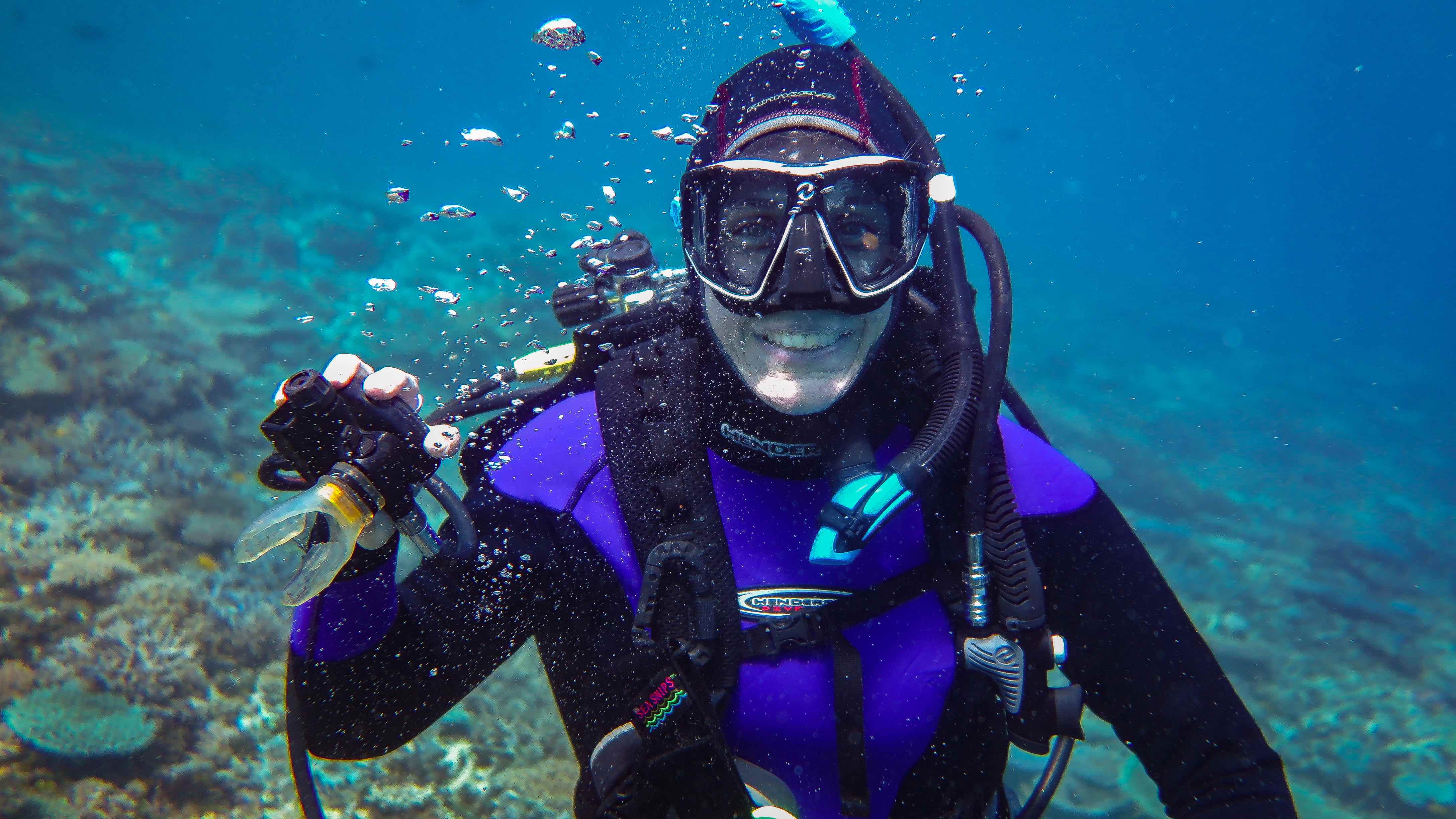Meet the team: National Geographic
July 9, 2019The National Geographic Society leads field engagement for the Allen Coral Atlas. Get to know the team and their work!
The Field Engagement team is working on two important components of the Allen Coral Atlas, both of which involve connecting with individuals and groups who work on-the-ground around the world.
First, we facilitate the gathering of georeferenced data on reef habitats for the University of Queensland (UQ) mapping team to use for “calibration and validation” of maps in the Allen Coral Atlas. This can come either from existing data collection efforts, or from new data collection by taking underwater photos while towing a GPS at the surface.
Second, we work to ensure the Atlas maps and other products can feed into conservation impact, for example by informing marine spatial planning.
Helen in Fiji, getting the equipment set up to try the Allen Coral Atlas photo transect method for the first time.
Our small team at National Geographic Society works closely with UQ and Vulcan. Dr. Helen Fox leads the team, drawing on her coral reef ecology background and marine conservation science work (and network). Brianna Bambic is our Coral Program Specialist, helping with organization, outreach, and training. She created a virtual reality experience of Half Moon Caye National Monument, Belize and worked as a field manager monitoring coral reef and seagrass bed ecosystems. Brian Free is our marine spatial scientist, helping develop technical resources and spatial analyses. He served in the Peace Corps in Mexico, working with GIS, and also researched marine spatial planning and illegal fishing.
Our goal is to engage the wider coral reef science, monitoring, and management communities, and enable the Allen Coral Atlas to reach more users and have greater impact.

Brian and Brianna are literally “in the field” doing a practice dry-run of the photo quadrants and GPS tracking that we use (underwater!) for to calibrate and validate map data
What are you reading right now?
Brianna: What a Fish Knows by Jonathan Balcombe.
Helen: Becoming Wise by Krista Tippett; What the Dog Saw by Malcolm Gladwell, Where You Go Is Not Who You’ll Be by Frank Bruni (I have a rising Junior…); and The Ugly One by Leanne Statland Ellis (for Mother/Daughter Book Club and because we have a family trip to Peru later in the summer!).
Brian: The Pioneers by David McCullough and People, Power, and Profits by Joseph Stiglitz.
What’s a map that changed your life?
Brianna: A map that showed multiple year projections of sea-level rise effects across the US and cities around the world.

Happy Helen underwater on Heron Reef helping the UQ mapping team. It's such a treat to be on Heron again! This is where I learned to SCUBA dive about 30 years ago, when I was working as a waitress and where I again returned multiple times in 1994 to 1995 as a Fulbright Scholar. (Assisted the late and legendary Bob Endean and Ann Cameron finish a paper and my first-ever scientific publication: Endean, R., Cameron, A.M., Fox, H.E., Tilbury, R., Gunthorpe, L. (1997) Massive corals are regularly spaced: pattern in a complex assemblage of corals. Marine Ecology Progress Series. 152: 119-130.)
What are you up to when not working on the Allen Coral Atlas?
Helen: Spending time with my family (see the last 2 books I’m reading for clues…) and what seems like a never-ending list of house and yard chores, though I also enjoy spending time with friends (preferably outdoors), crafting (I recently took a jewelry-making class with my older daughter, and a pottery wheel throwing class with my younger one), and the occasional date with my long-suffering husband.
Where are you originally from? Tell us about it.
Brian: Swarthmore, Pennsylvania. As it turns out (small world!), team leader Helen went to the college in this town, and so she pronounced it [SwaRthmore], while I, as a local resident, pronounced it [Swa_thmore]. There's more info on this unique fact.

Brianna on a video call with Charlie and Sarah from Vulcan, Helen, and some potential field collaborators
What’s some work you really admire right now?
Brianna: Tabletop Whale. A biology and illustration mapping and graphic artist, Eleanor, uses data, then codes the data to create a map or info-graphic of diverse subjects including Mars, butterflies, or how to create a human heart. I see this as a wonderful way to create interest and curiosity into the world of biology. Also, flat out brilliant to bypass ArcGIS to create an extraterrestrial map.
Share your field experiences or data with the team by sending a note
The Allen Coral Atlas is the first high resolution global map of the world’s coral reefs. The Atlas is built and maintained through a partnership between the University of Queensland, Planet, Arizona State University’s Center for Global Discovery and Conservation Science (GDCS), National Geographic Society, and Vulcan Inc.

